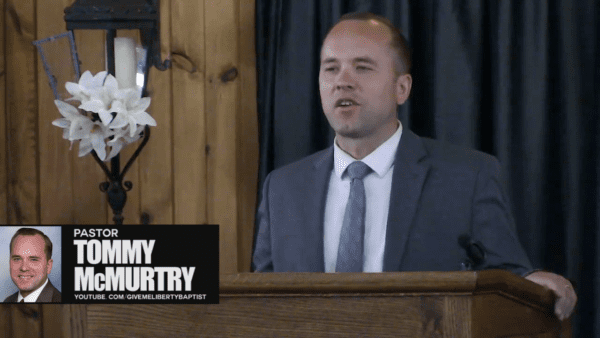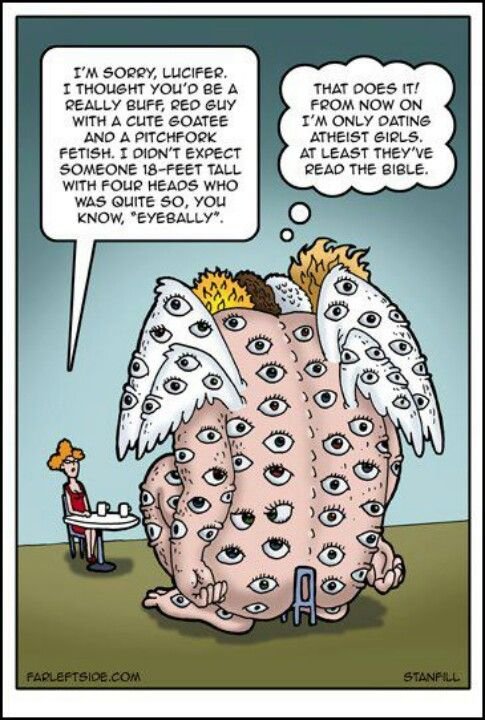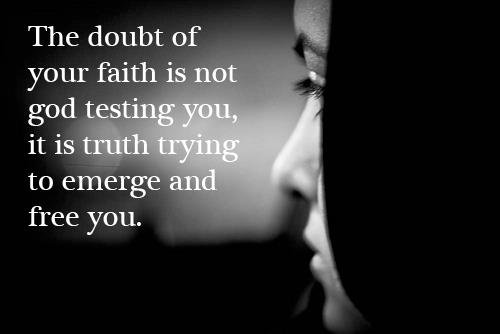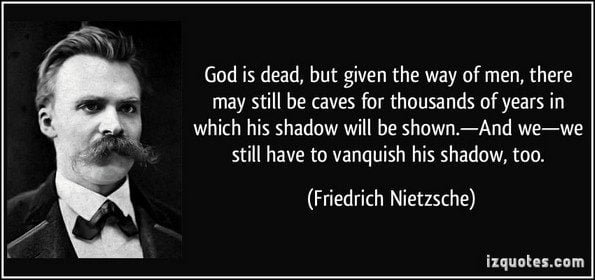
Originally posted in 2015. Edited, updated, and expanded.
The Bible gives some pretty good advice about counting the cost in Luke 14:28-30:
For which of you, intending to build a tower, sitteth not down first, and counteth the cost, whether he have sufficient to finish it? Lest haply, after he hath laid the foundation, and is not able to finish it, all that behold it begin to mock him, Saying, This man began to build, and was not able to finish.
Who starts a building project without first counting the cost? The key phrase here is counting the cost. Every choice we make has a consequence. I think a loose definition of Newton’s Third Law of Motion applies here: for every action, there is an equal and opposite reaction. Foolish is the person who does not consider the consequences of saying for the first time to family, friends, colleagues, and acquaintances, I AM AN ATHEIST.
When I left Christianity and the ministry in 2008, my wife came along with me. Polly was a few steps behind, but close enough that we could hold hands. We spent many hours reading books and having long discussions about the past, the Bible, and Christianity in general. Dr. Bart Ehrman was nightly pillow talk for many months. When we finally came to the place where we said to one another “We are no longer Christians,” we knew that telling our family, friends, and acquaintances would cause a huge uproar. What should we do?
Polly decided to take the quiet approach, keeping her thoughts to herself. When asked, she would answer and try to explain, but if people didn’t ask, she felt no obligation to out herself. She still operates by that principle. There are people she works with who likely think she still goes to church on Sunday and is a fine Christian woman. Several years ago, a woman Polly had worked with for 20 years asked her if she was going to church on Easter. Polly replied, no. Her co-worker then asked, So do you go to church? Polly replied, No. And that was that. I am sure the gossip grapevine was buzzing. Did you know Polly doesn’t go to church? Why, her husband was a pastor! And they don’t go to church? Never mind that the woman asking the questions hadn’t been to church in over a decade. She stays home, watches “Christian” TV, and sends money to the TV preachers she likes.
I took the nuclear approach. I wrote an open letter to my friends, family, and former parishioners. This was totally in character for me. I am an all-in kind of guy. In Dear Family, Friends, and Former Parishioners, I wrote:
I have come to a place in life where I can no longer put off writing this letter. I have dreaded this day because I know what is likely to follow after certain people receive it. I have decided I can’t control how others will react to this letter, so it is far more important to clear the air and make sure everyone knows the facts about Bruce Gerencser.
I won’t bore you with a long, drawn-out history of my life. I am sure each of you has an opinion about how I have lived my life and the decisions I have made. I also have an opinion about how I have lived my life and the decisions I made. I am my own worst critic.
Religion, in particular Baptist Evangelical and Fundamentalist religion, has been the essence of my life from my youth up. My being is so intertwined with religion that the two are quite inseparable. My life has been shaped and molded by religion and religion touches virtually every fiber of my being.
I spent most of my adult life pastoring churches, preaching, and being involved in religious work to some degree or another. I pastored thousands of people over the years, preached thousands of sermons, and participated in, and led, thousands of worship services.
To say that the church was my life would be an understatement. As I have come to see, the Church was actually my mistress, and my adulterous affair with her was at the expense of my wife, children, and my own self-worth.
Today, I am publicly announcing that the affair is over. My wife and children have known this for a long time, but now everyone will know.
The church robbed me of so much of my life and I have no intention of allowing her to have one more moment of my time. Life is too short. I am dying. We all are. I don’t want to waste what is left of my life chasing after things I now see to be vain and empty.
I have always been known as a reader, a student of the Bible. I have read thousands of books in my lifetime and the knowledge gained from my reading and studies has led me to some conclusions about religion, particularly the Fundamentalist, Evangelical religion that played such a prominent part in my life.
I can no longer wholeheartedly embrace the doctrines of the Evangelical, Fundamentalist faith. Particularly, I do not believe in the inerrancy of Scripture nor do I accept as fact the common Evangelical belief of the inspiration of Scripture.
Coming to this conclusion has forced me to reevaluate many of the doctrines I have held as true over these many years. I have concluded that I have been misinformed, poorly taught, and sometimes lied to. I can no longer accept as true many of the doctrines I once believed.
I point the finger of blame at no one. I sincerely believed and taught the things that I did and many of the men who taught me were honorable teachers. I don’t blame those who have influenced me over the years, nor do I blame the authors of the many books I have read. Simply, it is what it is…
The backlash from my letter was immediate and severe. Keep in mind I was not yet an atheist. All I said was that I could no longer embrace the teachings of Christianity. I was agnostic when it came to the God question. I still had lots of doubts and questions.
The reaction of my family and Polly’s family was the hardest to bear. For the most part, they said nothing. To this day, some family members, including Polly’s late parents, have not said one word to us about our defection from Christianity. It’s like there’s a huge elephant in the room that no one can see but us. Sixteen years of silence.
My friends and fellow pastors took to writing me letters, sending me emails, visiting me, preaching about me, and having prayer meetings focused on praying me back into the fold. The level of nastiness and judgmentalism was overwhelming. During this time, a long-time friend and parishioner turned pastor came to see me. I wrote about his visit in A Letter to a Friend. In the letter I wrote:
You got my letter.
I am certain that my letter troubled you and caused you to wonder what in the world was going on with Bruce.
You have been my friend since 1983. When I met you for the first time, I was a young man pastoring a new Church in Somerset, Ohio. I remember you and your dear wife vividly because you put a $100 bill in the offering plate. Up to that point we had never seen a $100 bill in the offering plate.
And so our friendship began. You helped us buy our first Church bus. . .You helped us buy our Church building. . . In later years you gave my wife and me a generous gift to buy a mobile home. It was old, but we were grateful to have our own place to live in. You were a good friend.
Yet, our common bond was the Christianity we both held dear. I doubt you would have done any of the above for the local Methodist minister, whom we both thought was an apostate.
I baptized you and was privileged to be your pastor on and off over my 11 years in Somerset. You left several times because our doctrinal beliefs conflicted, you being an Arminian and I being a Calvinist.
One day you came to place where you believed God was leading you to abandon your life work, farming, and enter the ministry. I was thrilled for you. I also said to myself, “now Bill can really see what the ministry is all about!”
So you entered the ministry and you are now a pastor of a thriving fundamentalist Church. I am quite glad you found your place in life and are endeavoring to do what you believe is right. Of course, I would think the same of you if you were still farming.
You have often told me that much of what you know about the ministry I taught you. I suppose, to some degree or another, I must take credit for what you have become. (whether I view it as good or bad)
Yesterday, you got into your Lincoln and drove three plus hours to see me. I wish you had called first. I had made up my mind to make up some excuse why I couldn’t see you, but since you came unannounced, I had no other option but to open and the door and warmly welcome you. Just like always . . .
I have never wanted to hurt you or cause you to lose your faith. I would rather you not know the truth about me than be hurt in any way.
But your visit forced the issue. I had no choice.
Why did you come to my home? I know you came as my friend, but it seemed by the time our three-hour discussion ended, our friendship had died and I was someone you needed to pray for, that I might be saved. After all, in your Arminian theology there can be no question that a person with beliefs such as mine has fallen from grace. . .
During the first few months after my initial letter, I heard from Laura Hardman, the wife of Evangelist Don Hardman. She bared her fangs and let me know that it was quite evident to her that I NEVER was a Christian.
About two years after the Dear Family, Friends, and Former Parishioners letter I wrote:
Almost two years ago I sent my friends, family and former parishioners a letter concerning my decision to deconvert from Christianity. I wish I could say my letter was well received. I wish I could say that people told me they supported my decision. I wish I could say I have been treated in a kind and respectful manner.
But I can’t.
A longtime friend of mine, Bill Beard, pastor of Lighthouse Memorial Church, drove over three hours to my home to talk (argue) with me about my deconversion. He and I had been friends for over 25 years.
Laura Hardman, wife of Evangelist Don Hardman, wrote me a scathing letter telling me that I never was a real Christian, I had been friends with the Hardmans for over 20 years. I wrote them back and I have not heard from them since.
Friends of mine for over 40 years, missionaries with Child Evangelism Fellowship, wrote to me and told me I was under the influence of Satan. They sent me literature to read. I returned it with a letter of my own. They never wrote back.
I stumbled upon a forum discussion about me. They were discussing what to do about Bruce.
I have received numerous emails from former parishioners telling me of the error of my ways. Some of them are deeply troubled about how this could happen. How could their pastor now be an agnostic who doesn’t believe in the Bible or God?
A few former parishioners took it upon themselves to tell me their conclusions about me. Many of them mentioned my reading habits. They told me I read too many books and they suggested I just read the Bible.
Two former parishioners wrote to tell me that though they disagreed with me, they loved me and were my friend. I really appreciated their love and friendship.
I hear bits and pieces of the gossip about me that is floating around Bryan and Defiance — people questioning whether or not I was ever a Christian. Some raise issues about my mental stability. One thing they never do? Talk to me personally.
My adult children have to field questions at work and college about their apostate father. Once again, the questioners never talk to me personally.
It is not much better on the family front.
Silence is how family has decided to deal with me. It’s like I never wrote the letter about deconverting from Christianity. Behind the scenes there is a lot of gossip about me and what to do about the Bruce matter. Last Christmas, the patriarch of the family, a pastor of 40 plus years, was intent on confronting me about my apostasy. I am grateful my mother-in-law quashed his plan to confront me. It would have been ugly. I mean ugly.
Polly decided that we could no longer do Christmas at her parent’s home. The stress and undercurrent are such that it is impossible to “enjoy” time with the family during the Christmas holiday (we do go to visit when the extended family is not there).
I wish I could tell you that I came through all of this unscathed, but I can’t. I decided to seek out a counselor two years ago. I knew I needed to talk to someone about the pain and deep wound I was carrying as a result of my defection from Christianity. I still see a counselor every few weeks. His work with me has been extremely helpful and has enabled me to move forward and away from the past. The scars remain. The viciousness of people who say they are followers of the man who said turn the other cheek and love your enemy has scarred me. Every time a Fundamentalist spews his bile on this blog, I am reminded of the deep wound I carry. I am also reminded that I am glad to be free from such an ugly, vile, and vicious belief system and way of life.
So how are things now?
Some family members are still silent. Perhaps they will never ask, inquire, or attempt to engage me in a discussion. I think some people are intimidated by me, so they avoid the elephant in the room. Others fear I might cause them to doubt or lose their faith, so they avoid all contact with me. I have come to accept this. I wish they would talk to me, but I know I can’t force the issue.
All of my Christian friends have abandoned me. I don’t blame them. I have come to see that our friendship was held together by fidelity to certain beliefs. Remove the beliefs and the friendship dissolves. If I came back to the Christian faith, I would instantly have dozens of friends. I would be lauded as the Preacher reclaimed From the Devil’s Clutches. Hmm . . . there is money to be made . . .
If I had to do it all over again, would I do it the same way? Would I write THE letter? Probably. My experiences have given me knowledge that is helpful to people who contact me about their own doubts about Christianity. I am often asked, what should I do? Should I tell my spouse? Should I tell my family, friends, or coworkers?
My standard advice is this: Count the cost. Weigh carefully the consequences. Once you utter or write the words I AM AN ATHEIST, you are no longer in control of what happens next. Are you willing to lose your friends, destroy your marriage, or lose your job? Only you can decide what cost you are willing to pay.
I know there is this notion that “Dammit, I should be able to freely declare what I am,” and I agree with the sentiment. We should be able to freely be who and what we are. If we lived on a deserted island, I suppose we could do so. However, we are surrounded by people. People we love. People we want and need in our life. Because of this, it behooves (shout out to the KJV) us to tread carefully.
I hope some of you will find this post helpful. My deepest desire is to help you on your journey. I am hoping that my walking before you can be of help to you as you decide how best to deal with and embrace your loss of faith.
This blog is here to remind those struggling with leaving Christianity or who have already left Christianity, YOU ARE NOT ALONE.
Bruce Gerencser, 68, lives in rural Northwest Ohio with his wife of 47 years. He and his wife have six grown children and sixteen grandchildren. Bruce pastored Evangelical churches for twenty-five years in Ohio, Texas, and Michigan. Bruce left the ministry in 2005, and in 2008 he left Christianity. Bruce is now a humanist and an atheist.
Your comments are welcome and appreciated. All first-time comments are moderated. Please read the commenting rules before commenting.
You can email Bruce via the Contact Form.









